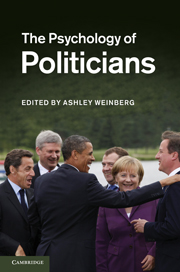Book contents
- Frontmatter
- Contents
- Figures
- Tables
- Acknowledgements
- Contributors
- 1 The psychology of politicians
- Part I Becoming politicians
- Part II Being at the centre of things
- Part III Coping with pressure?
- Part IV People as politicians
- 9 The political side of personality
- 10 Where red dictators coexist with promising democrats
- Index
- References
10 - Where red dictators coexist with promising democrats
The conceptualisation of politicians in post-communist Ukraine
Published online by Cambridge University Press: 05 December 2011
- Frontmatter
- Contents
- Figures
- Tables
- Acknowledgements
- Contributors
- 1 The psychology of politicians
- Part I Becoming politicians
- Part II Being at the centre of things
- Part III Coping with pressure?
- Part IV People as politicians
- 9 The political side of personality
- 10 Where red dictators coexist with promising democrats
- Index
- References
Summary
Overview
The collapse of the USSR revamped the political landscape of post-Soviet countries. The instant spread of new ideologies and development of multi-party systems caused the number of political leaders to skyrocket and the explosion of alternative media outlets challenged local electorates, with no prior experience, to choose between ideologies, parties and candidates. The superficial nature of voting in Soviet Union with a ‘one candidate, one ideology’ principle did not require complex decision making and had kept citizens detached from politics. Far from being a race, elections provided no agenda for the Soviet media or public scrutiny. As early as 1990–1 during the first democratic parliament and presidential elections, Ukrainian citizens had to choose between multiple candidates representing different ideologies and party affiliations. The choice voters had to make was not at all easy as a brand new political, social and media context required a completely different cognitive approach. What one could call ‘communist’ cognitive structures were ill-suited to the new realities and were to undergo substantial changes. The specific socio-political context in the USSR impacted on the political cognition of Soviet voters and began the development of specific political schemas. In this chapter it is argued that this process led to an overlap in old and new schemas over a period of time and here the cognitive structures of post-Soviet voters are assessed with an emphasis on the coexistence of schemas of both ‘communist’ and ‘democratic’ leaders.
Introduction
Since the inception of systematic voting research in the 1940s, scientists have attempted to describe voting behaviour in terms of social factors. Lazarsfeld canvassed the field with the so-called sociological or Columbia model (1944) stressing the importance of social factors in voters’ decision making. Campbell, Converse, Miller and Stokes (1960) went beyond this and put psychological factors, like early-learned social identifications with the party, at the core of their ‘funnel of causality’ model, also known as the social-psychological or Michigan model of voting. The rational choice approach, sometimes referred to as the Chicago model, was brought to political science by Downs (1957), describing voting as value-maximising ‘rational calculus’, where voters weigh the pros and cons of each candidate based on their self-interest.
- Type
- Chapter
- Information
- The Psychology of Politicians , pp. 203 - 233Publisher: Cambridge University PressPrint publication year: 2011
References
- 1
- Cited by



